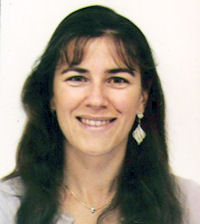 |
STAGES PER STUDENTI DI SCUOLA SECONDARIA STAGES INVERNALI 2009 |
 |
 |
GRUWÉ MAGALI
|
My name is Magali Gruwé. I am 40 years old and mother of two little boys (an almost 3 year old boy, and a 9 month old baby). I am a Belgian physicist. I have studied physics at the Brussels University in Belgium, from 1986 till 1990. I then prepared a physics doctorate, still at the Brussels University in Belgium, on a topic which required me to travel often to CERN (Geneva, Switzerland). I have finished by doctorate in 1995, and have worked since then at CERN on different experiments and topics. My current position is Engineer in Charge for the LHC, the Large Hadron Collider. Q: How and why did you decide to study physics and which is the best memory of your life as a student? I chose to study Physics because I was extremely curious and very eager to understand the rules of nature: how things work, what is the reason for some nature events, etc... My best memory of my life as a student was a visit of CERN while I was in my third year of studies. We were a group of about 15 students in physics at the university in Brussels (Belgium) and we came to CERN for a two days visit. It was on the one hand an occasion for doing an extremely interesting visit of scientific installations, but also and above all an occasion for developing friendship amongst us. In the same line, my best memory as a doctorate student was attending an international physics school for two weeks in Russia. An incredible opportunity to meet physicists and future physicists from all over the world and develop friendship with them. Q: Which difficulties did you have to face and what was the most exciting episode of your career? The main difficulties I have encountered in my career have always been the renewal of contracts. Permanent positions in fundamental research (and more specifically physics) are few and difficult to obtain. The most exciting episode of my career was the first operation of the LHC accelerator, on which I am currently working. Q: What are you working at presently? I am currently an Engineer in Charge for the LHC. That means I am working on the largest particle accelerator of the world, the LHC, located at CERN. I am part of a team who is present 24 hours a day, 7 days a week in the control room of the accelerator. Our task is to operate the accelerator: produce particle beams which circulate and are accelerated in the accelerator, and make these particles collide with each other at the center of four experiments which are located at four different places around the LHC. We thus produce particle collisions which are then used by other physicists to make studies, search for new particles and understand the structure of matter. Q: Which do you believe will be the next discovery in physics? Possibly the discovery of the famous Higgs particle which should explain the fact that particles do have a mass. Such a discovery might actually be done by the experiments of the LHC on which I am working. Q: In your opinion, which is the best discovery ever and who is your favorite scientist? I would say the best discovery ever is the discovery/invention of vaccines. But I am afraid I do not have a "favorite" scientist. I cannot chose amongst the so many scientists who made extremely valuable contributions to science. Q: How important is the collaboration in scientific research especially among researchers from different countries? It is more than important: it is essential. It is essential for making sure public money is used in the most efficient way, essential for sharing the knowledge, the results, the expertise, etc... It is also essential on a more "humanistic" point of view: during these times of war, fights, racism, etc... all over the world, I believe it is extremely important that the scientific community set these dissensions aside and work together for a common goal. Q: How can a scientist be defined and how do talent, intuition and study influence his profession? I would say the answer to this question very much depends on the domain and topic the scientist is working on. Science has an equal need for hard-workers, talented people, scatter-brained people, conscientious and systematic minds, etc... I reckon however, a common quality for a scientist should be curiosity. Q: What are your hobbies and passions and what book would you suggest us to read? Hobbies and passions: since a few years I "fell in love" with embroidery. It is relaxing me after a hard day of work and helps me getting rid of the stress. I also enjoy very much walks in the forest and the mountains. Again with the same advantage of being able to relax and "switch of" from work. Concerning books, one of my favorite is "the pillars of the Earth" which I have read already 3 times. I also very much enjoy best sellers such as Harry Potter's series or the Lord of the Rings. Nothing to do with science... but so pleasant to read! Q: How do you see the future of research in this period ofglobal economic crisis? I certainly do hope that politics understand that fundamental research is essential not necessarily on the short term but on the long term. Of course I am very worried that in this period of global economic crisis money is thought to be best invested in other domains. I do think however that it would be a big mistake in the long term. Fundamental research might look superfluous and unnecessary at first sight, but one should always keep in mind that it is impossible to predict when and in which field the next discovery will happen, and which implications on every day life it might have. |